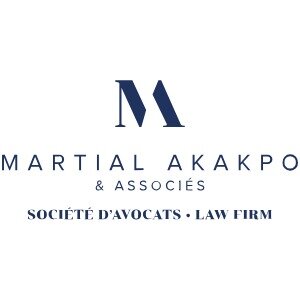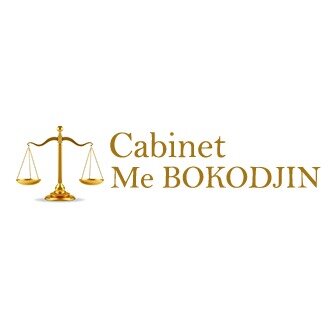Best Corporate Governance Lawyers in Togo
Share your needs with us, get contacted by law firms.
Free. Takes 2 min.
Or refine your search by selecting a city:
List of the best lawyers in Togo
About Corporate Governance Law in Togo
Corporate Governance in Togo refers to the set of rules, practices, and processes by which companies are directed and controlled. This field aims to balance the interests of a company’s many stakeholders, including shareholders, management, customers, suppliers, government, and the community. Togo’s approach to corporate governance is largely influenced by regional regulations under the Organization for the Harmonization of Business Law in Africa (OHADA), as well as local legislative instruments. The legal framework is designed to enhance transparency, accountability, and overall corporate responsibility in the Togolese business environment.
Why You May Need a Lawyer
Navigating the area of corporate governance can be complex, especially if you are setting up or managing a company in Togo. Common situations where legal help can be essential include drafting and reviewing corporate bylaws, ensuring compliance with OHADA regulations, handling conflicts between directors and shareholders, and managing mergers or acquisitions. Lawyers also assist with dispute resolution, risk assessments, and regulatory filings. A legal expert can help protect your interests, avoid costly mistakes, and ensure your company is operating within the bounds of Togolese law.
Local Laws Overview
Corporate governance in Togo operates within the framework of OHADA laws, in particular the Uniform Act relating to Commercial Companies and Economic Interest Groups. Key aspects of local laws include mandatory corporate organs such as the board of directors and statutory auditors for certain business forms. There are provisions for minority shareholder protection, board responsibilities, regular filing and disclosure requirements, and rules for profit distribution. Togo also has specific laws concerning anti-money laundering, anti-corruption, and ethical business conduct that impact governance practices. Companies must maintain accurate records and meet strict reporting standards.
Frequently Asked Questions
What is the main law governing corporate governance in Togo?
The primary regulation is the OHADA Uniform Act relating to Commercial Companies and Economic Interest Groups, which is directly applicable in Togo. It sets forth detailed rules on how companies are structured and governed.
Who is responsible for corporate governance in a Togolese company?
Corporate governance responsibilities typically lie with the board of directors and management, who must act in the company’s and shareholders’ best interests. Statutory auditors may also oversee certain governance aspects.
Are there requirements for board composition?
Yes, depending on the legal form of the company, there are minimum requirements for the number and qualifications of the board members. For example, public companies require a board of directors with at least three members.
What rights do minority shareholders have?
Minority shareholders have specific rights under the OHADA regulations, including access to company information, calling meetings under certain circumstances, and challenging decisions taken by the board that harm their interests.
How often must companies hold annual general meetings in Togo?
Companies must hold an annual general meeting at least once a year to review accounts, approve financial statements, and make key governance decisions.
Is corporate governance compliance mandatory for all businesses?
Most provisions apply to all registered companies, with additional requirements for certain types of companies, such as public limited liability companies or those listed on the stock exchange. Small businesses may have simplified obligations.
What are the penalties for failing to comply with governance laws?
Penalties vary, but may include fines, civil liability, nullification of company decisions, or even criminal sanctions for serious breaches such as fraud or bribery.
Can foreign investors participate in company governance?
Yes, foreign investors can be shareholders or sit on the board, subject to certain local registration and reporting requirements.
What role do auditors play in corporate governance?
Statutory auditors are responsible for reviewing financial statements, monitoring for fraud, and ensuring legal compliance. Their independence is essential to sound corporate governance.
How can disputes among shareholders or directors be resolved?
Disputes can be resolved through negotiation, mediation, arbitration, or litigation in local courts. Many companies also include dispute resolution mechanisms in their bylaws.
Additional Resources
Individuals seeking further information or legal assistance in corporate governance can consult the following resources:
- Ministry of Justice and Legislation of Togo for information on company and commercial law
- OHADA National Commission in Togo for guidance on uniform business laws
- Togo Chamber of Commerce and Industry for local business regulations and corporate registration
- Local law firms with corporate law departments and experience in OHADA law
- Professional associations of chartered accountants and auditors for corporate compliance standards
Next Steps
If you require legal advice or assistance with corporate governance in Togo, start by identifying the specific issue or compliance need. Gather all relevant company documents, including bylaws, shareholder agreements, and previous regulatory filings. Consider contacting qualified legal practitioners who specialize in Togolese corporate law and have experience with OHADA regulations. Initial consultations will help you assess your situation and understand your options. Finally, maintain open communication with your legal advisor to ensure ongoing compliance and to stay informed about regulatory changes.
Lawzana helps you find the best lawyers and law firms in Togo through a curated and pre-screened list of qualified legal professionals. Our platform offers rankings and detailed profiles of attorneys and law firms, allowing you to compare based on practice areas, including Corporate Governance, experience, and client feedback.
Each profile includes a description of the firm's areas of practice, client reviews, team members and partners, year of establishment, spoken languages, office locations, contact information, social media presence, and any published articles or resources. Most firms on our platform speak English and are experienced in both local and international legal matters.
Get a quote from top-rated law firms in Togo — quickly, securely, and without unnecessary hassle.
Disclaimer:
The information provided on this page is for general informational purposes only and does not constitute legal advice. While we strive to ensure the accuracy and relevance of the content, legal information may change over time, and interpretations of the law can vary. You should always consult with a qualified legal professional for advice specific to your situation.
We disclaim all liability for actions taken or not taken based on the content of this page. If you believe any information is incorrect or outdated, please contact us, and we will review and update it where appropriate.
Browse corporate governance law firms by city in Togo
Refine your search by selecting a city.











